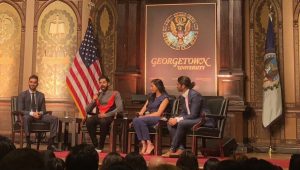Georgetown University has only one professor teaching Hindi, a language spoken by more than half a billion people worldwide.
Last year, Dr. C. Christine Fair, an associate professor in the SFS, taught seven classes in a semester—more than a tenured faculty member would be expected to teach for the entire academic year. This fall, she will teach a double workload of two Hindi classes and three security studies classes.
The SFS retains only a handful of South Asian professors in faculty ranks, offers only one formalized South Asian curriculum for undergraduate students, and provides minimal South Asian language instruction and structured academic tracks. In response, members of Georgetown’s South Asian community created a working group and drafted a petition calling for the university to hire more South Asian professors and offer more courses related to South Asia and South Asian languages. The petition has 261 signatures at the time of publication.
“That a subcontinent of two billion people with a history that stretches back to the first civilizations, every single world religion, and might I say, a very strong geopolitical presence in the region—it is a shame that Georgetown has little to nothing on this region,” Nikash Harapanahalli (SFS ’24), one of the petition’s three authors and vice president of the South Asian Society, said.
Harapanahalli, Suhani Garg (SFS ’23), and Shevani Tewari (SFS ’24) launched the petition this spring. “People know that this is important and they see it as missing at Georgetown. The problem is bringing people together to work on it,” Garg said.
The only formalized South Asian curriculum for undergraduate students is the India Initiative, which focuses on research and teachings around India. The initiative, however, has a non-inclusive and politicized history on campus.
First, the initiative limits its focus to India—meaning much of South Asia is not represented. “South Asia is a mosaic, not a monolith. And any program that covers it must reflect that,” Harapanahalli said.
According to faculty, the India Initiative has also been riddled with leadership problems. The former director of the initiative, Dr. Irfan Nooruddin, is on leave from the posting but remains a professor of Indian politics at Georgetown. His replacement, Dr. Cecilia Van Hollen, is a non-tenured professor and not of South Asian descent.
“For too long at Georgetown, the study of India has been organized by people with no connection to India—no lived experience and no academic training,” Dr. Shareen Joshi, professor of development and economics, said.
“Imagine if the study of the United States boiled down to one person, in London. It would be laughable,” Joshi added. Fair similarly pointed out the implications of how the initiative has been structured. “I think it’s tone-deaf, really tone-deaf,” she said.
Decisions about the India Initiative curriculum were limited to a handful of professors and included no opportunities for student input, according to Garg. “We know that the process for creating initiatives related to South Asia have not been inclusive, not inclusive of the faculty and by extension, not inclusive of the students,” Garg said.
Some professors have noted this problem is reflective of institutional issues within the SFS. “I have signed countless petitions from justifiably irate students about the state of India and South Asian studies at the SFS,” Dr. Jacques Berlinerblau, professor of Jewish civilization, wrote in an opinion piece for the Voice. “The irony is that we do have a few top-flight scholars of India on our faculty, often left out of the curriculum decision-making processes. Shouldn’t they be the ones tasked by the SFS to build a coherent program of study geared to this area? And shouldn’t they work as a collective?”
Joshi stressed the importance of having tenured professors—who, in theory, have published more research and enjoy greater academic freedom and protection from termination—in any curriculum-changing working group. “That’s how [the University of] Chicago did it. It’s how all campuses that are serious about a region do it,” Joshi said, emphasizing that bringing together experts with a long-term future at the university contributes to the sustainability of proposed changes.
In the meantime, professors like Fair are overburdened. “I need someone to negotiate a reasonable teaching load from me,” Fair said in an interview with the Voice. “I don’t know how to do it. I can’t do it myself and the people that I’ve asked have not taken it on board.”
To broaden the scope of South Asian programming at Georgetown, students like Harapanahalli believe Georgetown must expand the languages it offers to students. The Hindi program at Georgetown has been inconsistent in its scheduling and often poorly advertised to students.
Harapanahalli wanted to take Hindi, but was unaware of its availability. As a result, they made the decision to study Persian instead. “That altered my track, the next four years of my life.”
Fair is working to expand the language offerings at Georgetown. She has been searching for adjunct language instructors for different programs, including Bangla, Urdu, and Tamil.
She noted that university finances play a factor in why certain languages are offered, while others are not. “Without some significant confidence that students would enroll in those classes, it’s a big risk, it’s a big gamble the university is taking,” she said.
But according to Garg, informal petitions released by the South Asian Society to gauge interest in Hindi and Urdu classes noted that more than 40 students would take one of the two courses should they be offered, perhaps proving the demonstrated commitment Georgetown requires to make economically shrewd choices.
“We were able to show the administration that students are interested in taking South Asian courses because that was a common excuse,” Garg said.
Garg and Harapanahalli have been in conversation with Dean Joel Hellman and Vice Dean Mark Giordano, who works on the faculty committee of the India Initiative. According to Garg, Hellman agreed to call a faculty meeting with students present to discuss tangible steps the administration can take to meet the demands of the petition.
“It is the beginning of a conversation the university must have with its students,” Fair said.
Beyond administrators, Harapanahalli called on Hoyas to go beyond simply signing the petition and educate themselves on the region and its diversity.
“What we would want from the community isn’t just to sign this or to push for this but to be aware that there are unique cultures and histories and languages and futures in this group of people,” Harapanahalli said. “I deserve the same resources to critically analyze my heritage.”






